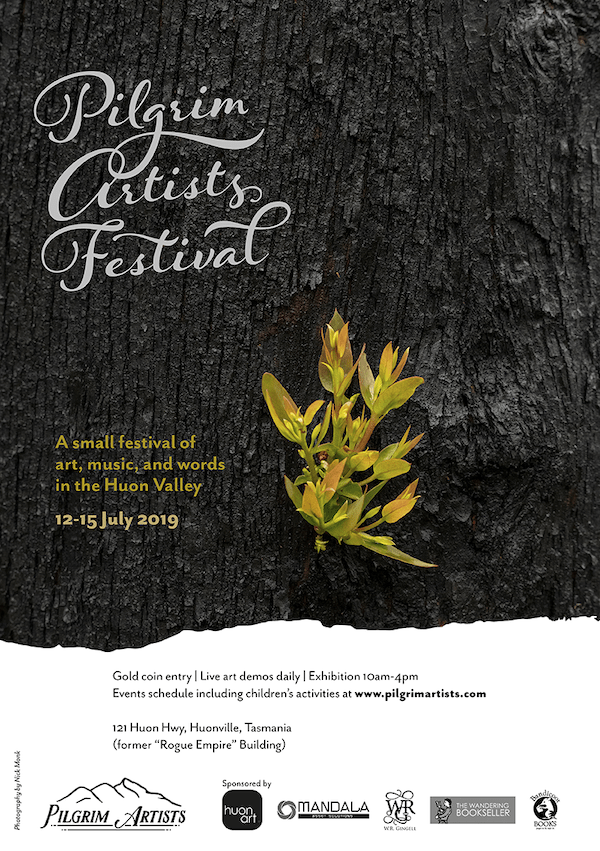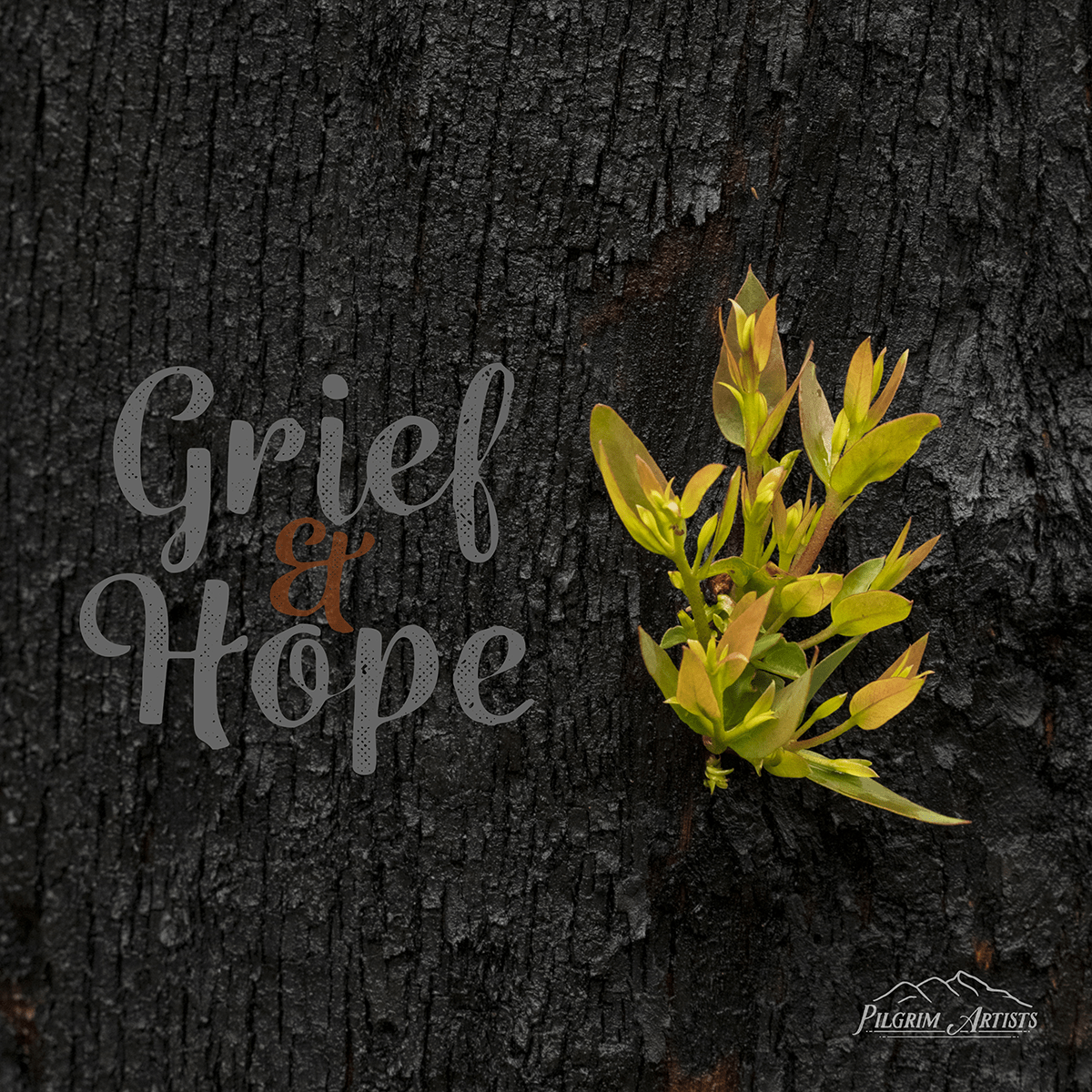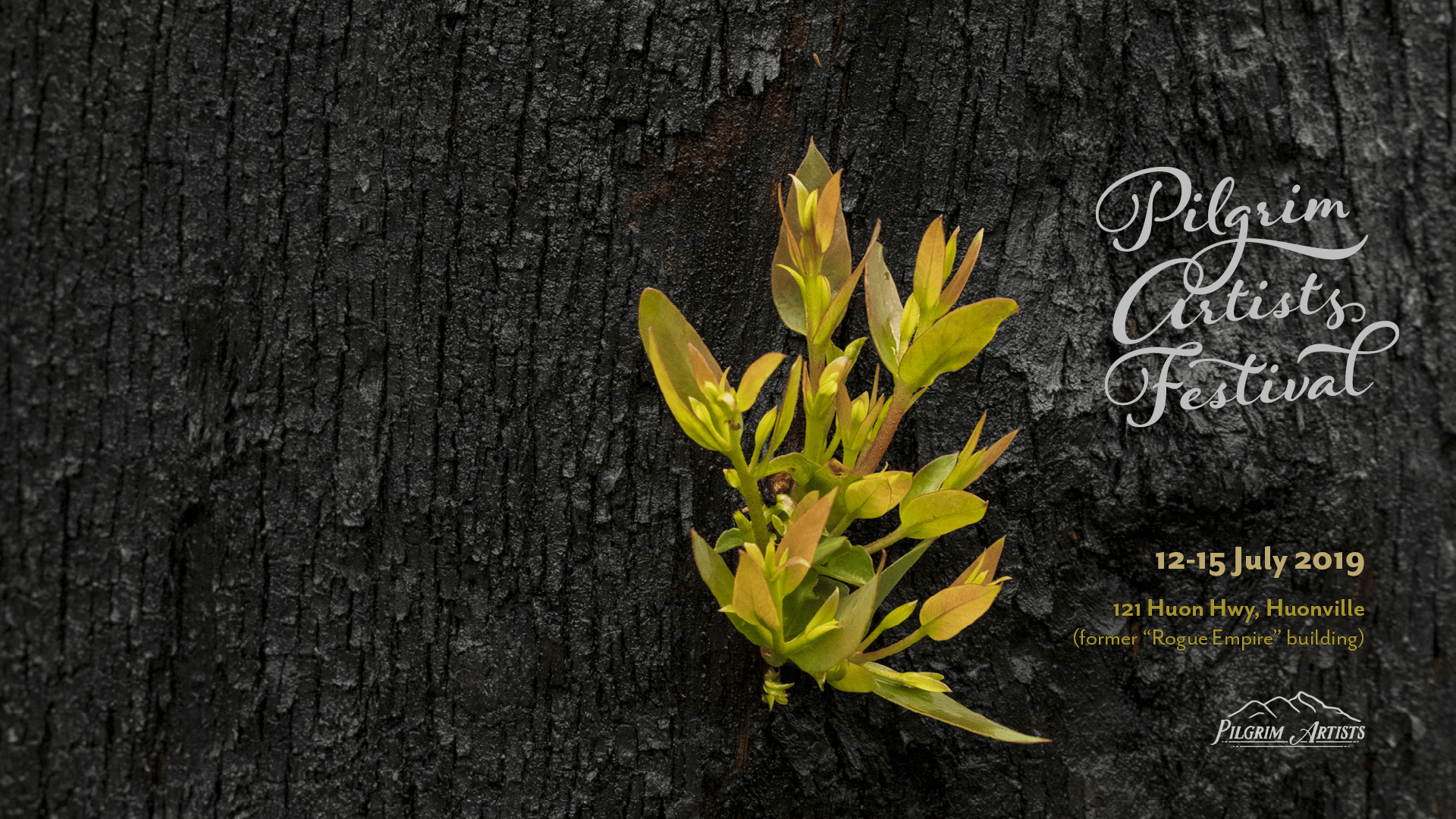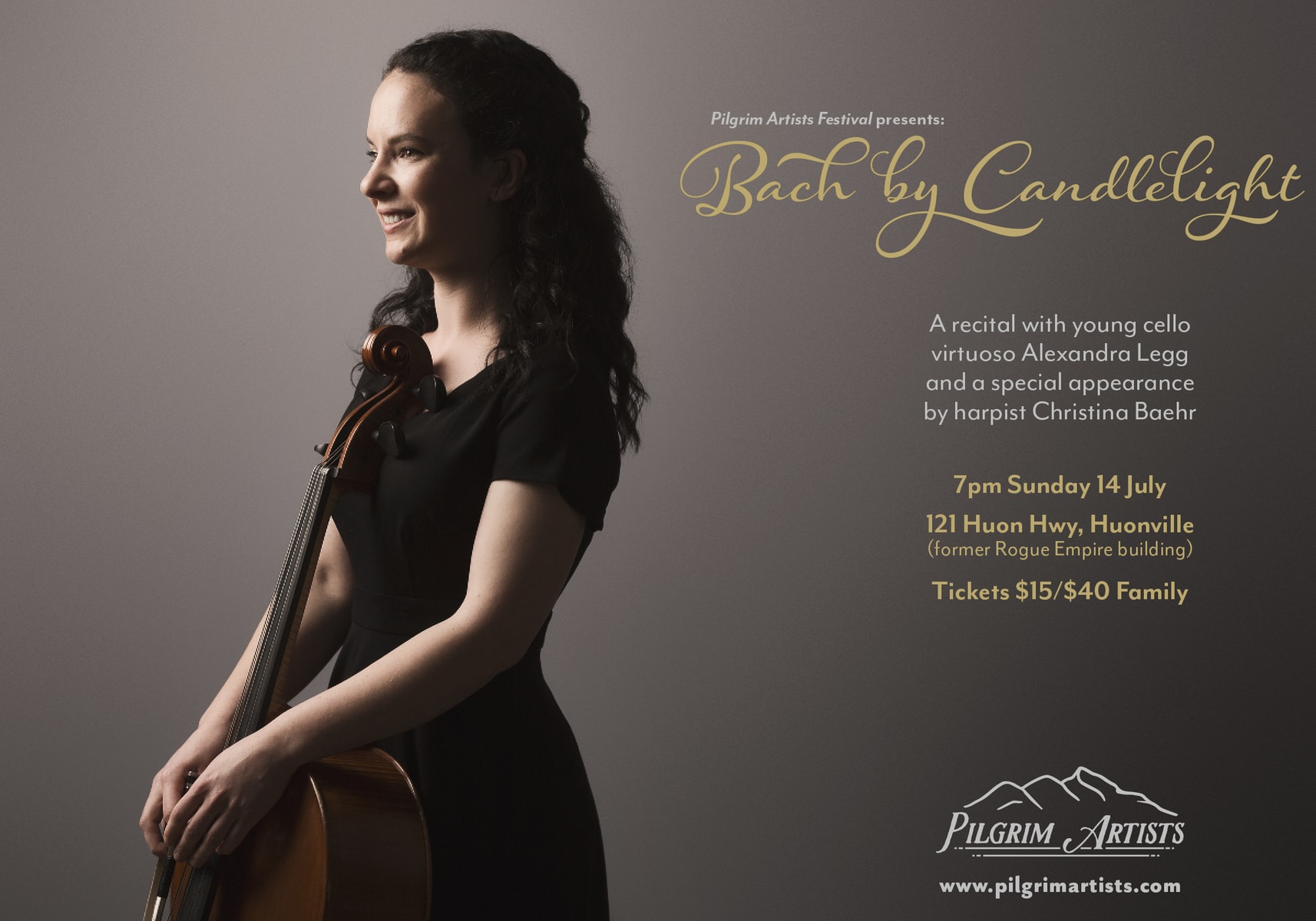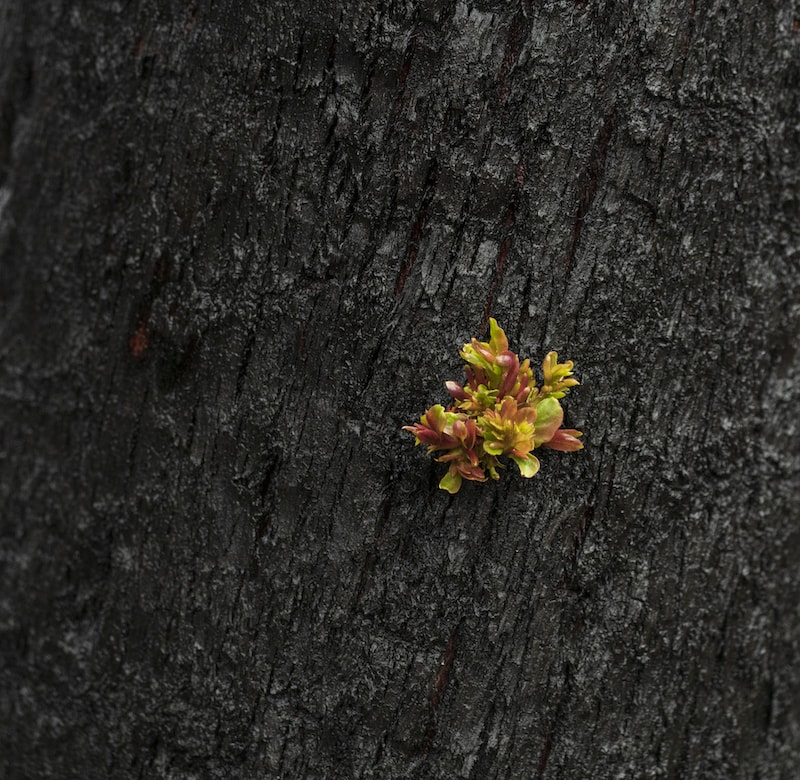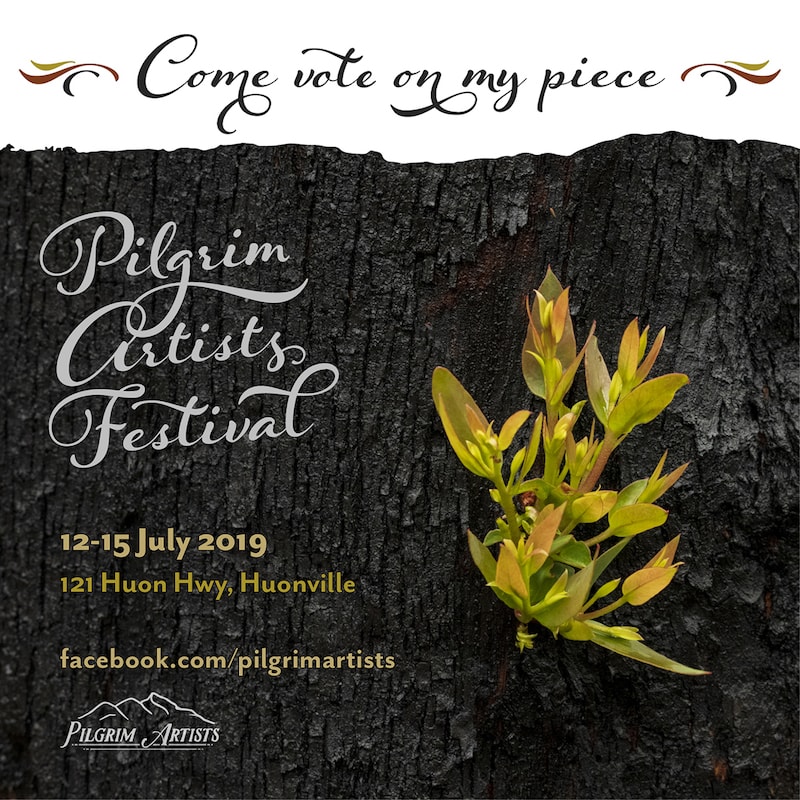Pilgrim Artists Festival — 2019 Literary Finalists
For our 2019 Pilgrim Artists Festival, we invited literary submissions of fiction, non-fiction, and poetry in three age brackets: adult (18+), young adult (13-17), and child (12 and under).
Writers for this year's festival had a maximum of 500 words to explore our 2019 festival theme of Grief and Hope from a Christian perspective. All entries were judged anonymously by an independent team of literary curators. That is, the curators had no idea whose work they were evaluating.
The curators then chose three finalists in each category at each age level for the public to vote on in person at the festival. We encouraged everyone to vote who attended the 2019 Pilgrim Artists Festival (held 12-15 July, 121 Huon Hwy in Huonville).
Below you'll find the people's choice winners of the $200 Wandering Bookseller prizes for adult writers. You'll also find the non-winning finalists', along with the top runners up. (You can read the youth entries here.)
Fiction
Adult (18+) Winner
King of Grief, Queen of Hope
By Suzannah Rowntree
The gardens of Hades are barren when I come.
He snatches me from the sunlit lands and carries me to the underworld, a dark chasm lit only by the distant flames of Tartarus. His house is of black marble, and as he drags me through the shadowed halls, I try to empty my mind of everything but this moment.
I know the stories. I know that the gods have cruel desires.
Instead, he opens the door to a walled garden. A black pool glitters at the centre. Naked sticks rattle in the earth, but nothing lives here.
“This is yours, Lady Persephone,” he says.
Then he leaves.
— —
I’m just glad Hades leaves me alone, so I don’t ask questions. I infuse the pool with light and call grass and asphodel from the dead soil.
When he visits again, he comes with a gift.
“I have brought you a servant.” A veiled shade follows him into the garden and I wonder if he wants me to thank him for giving me a slave when I once had friends, a desert when I once had flowers.
I wonder why he took me.
Hades inspects a young shrub. “What’s this?”
“A pomegranate,” I say.
For a moment, I think he’s going to speak. Then he swallows the impulse and leaves.
— —
On the day my pomegranate tree blooms, I find the shade sitting beneath the tree wiping her eyes with her veil. She says her first word: Springtime.
Little by little, she remembers how to speak. She talks about finishing this garden and moving on, the underworld blooming at our touch.
She doesn’t remember her name, so I call her Lethe.
— —
My pomegranate tree bears fruit, but as I peel it open Lethe grabs my wrist. “If you eat, you will become a creature of his realm.”
I hurl the fruit at the wall.
— —
It’s only a matter of time till my mother finds me.
Hades keeps sending gifts: servants, seeds, pruning-hooks and shovels. As the garden fills with life, so do the shades. The third time he visits, he dismisses the servants and looks at me with tired eyes. I wonder if he is always this sad.
“Your mother grieves without hope. Crops and men die, and no one sacrifices to the gods.” He sighs. “I am to send you back.”
Back to the home he took from me. Back to wind and mother and sunlight, but first I have one question.
“Why did you take me?” I spit.
He is the lord of the dead. He cannot sugar his words, as other gods might. “I need you,” he admits.
I think of Lethe, and to my surprise, I understand. I am springtime, but he is pain. No wonder the dead suffer, if that is all he can give them.
Before he can stop me, I rip open a pomegranate, and the juice is sour on my tongue.
— —
The gardens of Hades are barren when I come. But where I tread, they bloom.
Adult (18+) Finalists (Fiction)
The Song
By Cheryl Chong
CLARA
A blind girl feels her way around the edge of town, and stops at a doorway. A wind stirs. She lifts her head, and begins to sing.
LUCIAN
The wind carries the song up, in through the window, to a merchant's ears. His pen clatters to the floor, and painful memories rise, unbidden. The song pierces his soul. He looks down to see the singer’s face.
Suddenly, in a flutter of parchments, he leaps to his feet and rushes downstairs. He has just remembered a forgotten servant, and a forgotten wrong.
IRENE
The wind carries the song through the streets. It floats towards an old woman crouched over a heap of rubbish, collecting discarded nails and screws to sell. The song ripples delightfully in her old, wrinkled ears, bubbling with joy. It reminds her of how just yesterday old Irene has been asked to help with that fishwife’s baby across the way, poor young thing. She beams at the thought. It is the closest she will have to a child again.
Her grief is muted and peace fills her heart as the music floats around her.
ARIADNE
A wealthy, middle-aged noblewoman lingers in the market on a litter. She opens the curtain to let in the breeze - and the song. Her steel heart hesitates.
Five years ago, she had turned down Lucian’s hand in marriage to pursue an exciting life of independence. It was an easy refusal; he was too low-born, and she had too much money. Suddenly, there, in the midst of her wealth and her nobility, she sees the dissipation of her life unfolding before her. She wonders for a moment if he would have her back.
TRISTAN
At the heart of the town, a prisoner lies listless in chains, still awaiting sentencing. His ears hear only prison noises: the crying and moaning of other prisoners, the rattle of bars and slamming of doors; the echo of footsteps through countless corridors.
A song floats on a breeze through the high, barred window. That voice! Whose is that voice?
At last a memory surfaces. A beggar girl who used to join him and listen to his mother’s stories about sorrow and healing. What was her name? Clara? What a song - what a voice.
Without warning, his own cell door clangs open. Is it a beating? Is it the trial? What is his enemy, his old master Lucian doing here? “No charges,” says the guard. “Plaintiff wants you freed.” Dazed, he is unchained and led out, as if through a dream. He is unceremoniously given his clothes back from five years ago.
There, in the lobby, his master humbles himself before his servant, and asks forgiveness for a selfish old man. He had fancied himself in love; and the money had been found, after all.
EPILOGUE
Tristan does not return to the merchant’s service immediately. With Clara, he hurries to the slums to find his mother. This time he will not leave home without his family.
Diagnosing Disappointment
By Jackie Law
The day he couldn’t decide whether to open his laptop or not was the day Henriecks booked a doctor’s appointment for the first time.
She was as breezy as the summer skirt she wore in August; she’s not from Tasmania, he thought. He saw the back side of her mostly, following her down the hall to the frosted-windowed room. She was young. Ten years older than him, but a figure that cut its way through space, where his only slopped. Dark wavy hair that bounced on her shoulders. He supposed she had dark eyes, too, but he did not meet them. Could not, not till the end.
‘How can I help you today?’ her voice was clear and high.
‘I think – I’m sick.’ Henriecks squeezed his eyelids shut for a moment as the sound of his words pushed him further under.
‘Alright. How do you think you’re sick?’
‘Like, in the… head.’
‘Mm?’
‘I sorta, I don’t know what to… do… anything… anymore.’
‘Has something changed?’
‘No.’ He saw the blurred lines of her eyebrows rise. He wasn’t going to tell her that in the thirteen months since finishing uni, he had begun to wonder what was the big deal with adult life. Pretty well everything had lost its ‘first time’ feeling. He was solving the same problem every week for a new name. Buying the same food to eat at the same time every day. Keeping himself to himself while lurking all over Insta, watching various fandoms implode, in between binge-viewing prestige TV and the nightly dross of Married at First Sight.
‘Well, let’s think about the last two weeks. Over that time, have you felt down, depressed or hopeless?’
‘Yes,’ he said quietly.
‘And, over that time, have you felt little interest or pleasure in doing things?’
‘Yeah, well that’s just it, eh? I can’t even work out what I want… to do.’
‘Alright,’ she seemed to soften, ever so briefly, and Henriecks wondered, also briefly, if he could curl up in her lap, go home in her car?
‘Do you feel like you might need some help for this?’
‘I reckon.’
She talked through the options, printed a few pages, signed them, did her job, and the appointment was over. She held the door open at ear-height. As he passed her, his arm brushed her lowered one and he instinctively looked up to see her reaction. Still breezy, but then her eyes narrowed. She leant against the door and sighed.
‘I don’t know that any of this is what you really need,’ she said. ‘Go take a risk, go risk yourself on something.’
‘What?’
She shrugged like she knew but she didn’t want to say.
‘Do you…? What do you take a risk on?’
‘Jesus Christ.’
Henriecks stared at the wall outside for a moment longer than he thought he would before he walked through the door.
Adult (18+) 1st and 2nd Runner Up (Fiction)
Jude and Harriet Smith,
Apostles to a Few
When my sister went to Darwin to find a radiator, she brought Jude back instead. Harriet swears he was better looking. I never saw the radiator. Fancy, those drongos knew each other a week before being wed.
Jude was fresh to the Outback. When the War ended, he’d had his heart set on christianising China, but the commies forced everyone out in ’48. He got posted instead to a mob called the Ngiri — a few thousand blackfellas wandering about in the desert, west of nowhere. What a wing-clipping for a bloke with bigger dreams. Word is, he had an uncle offer him an upper management job with Marlboro in Victoria. To think what that boy turned down.
But my sister did her magic, brought order to Jude’s zeal and produced the boys. What those boys have done with themselves is another story. Ray must be nearing thirty now, bluing his life in theatre. Theatre and waiting tables. Is there a worse hell? You’ve heard the goss about Graeme marrying a black. We all warned him, except his parents. Stubborn as mules. Ian went down the gurgler after Vietnam, poor blighter. And Kev is in Sydney studying bankruptcy law. If that sounds promising, don’t hold your breath. They talk about black sheep like you can only have one. The Smiths had four. Must’ve come as a blow that there’s not a missionary or a pastor among them.
I’m no good at maths, but Jude and Harriet have given thirty odd years to their work, and got what? A half dozen converted blacks. One family in a tiny mob, maybe. Those are poor dividends. And now Jude’s crook with cancer, and they’re moving back to Melbourne next month for care. Going out with a whimper and no bang.
George, they’ve asked if they could live in mum’s old shack. Can you give the place a look in and a bit of a clean before [… letter breaks here]
— —
Prime Minister,
I found the attached letter in an old box in the Krais College archives. Please forgive my manual translation of the English, I wanted to get at the heart. I know you are busy with our medical outreach to Seattle, but I think this will please you very much. It should suit your independence day speech at the centenary. More than that, I realise it will have deep personal meaning for you since your mother is Ngiri.
Peace in our Saviour’s name,
Deibid Hurley
5 Mar 2206
Asha — Hope
By Mairi Girgis
Sorger bliver mindre og glæder større af at blive delt. "Sorrows becomes smaller and happy events becomes bigger by being shared."
— An old Dutch saying.
She pulled the scarf a little tighter around her neck. Three months today. How could time move on and yet stand still. It only seemed like yesterday. Would the tears ever stop.
The mid autumn sun was trying to push its way through the clouds. Little shafts of sunlight hit the edge of the wooden bench but the warmth didn’t touch her. This is what it’s like to slowly waste away she thought. If the pain doesn’t kill me, the cold in my bones certainly will.
A little black beetle skittered from under the leaves before scuttling away again. The afternoon hours passed and slowly the early evening darkness started to fall like a heavy blanket on the afternoon. It was time to go home. Home where the darkness settled in.
How long, O Lord, will you hide your face from me?
So much noise in the silence. The persistent voice that would not stop. If only you’d prayed more. If only you loved more. If only you hadn’t gone away. If only… if only… So many regrets. So much time lost. If only… if only…
As she trudged up the steps to the front door a voice called out. A tentative “Hello…” She put the key in the lock.
“Hello…” again. She’s speaking to me. She turned, and there on the next porch was a little woman in a brightly coloured sari, with a thick woolly jumper. A strange but somehow comforting juxtaposition. “My name is Asha! Will you come?”
A million little thoughts flickered through her mind. Not today. Another time. I cannot. Too much.
But then, why not. What else is there?
She is welcomed in. The house has a strong smell of curry mixed with incense. A complex aroma. Sweet tea in a beautiful gold rimmed cup. Warm to the touch. As she looks around she sees the colours of India. Rich. Beautiful.
On the wall the pictures of loved ones. “My sister”, she says quietly, noticing the glance. “She was gone last year. I miss her so much.”
Surprised, she lifts her eyes and suddenly she sees the pain, the unspoken grief. The tears begin to well again, but something is different. Asha sits next to her and puts her arm around her. “You’ve lost someone too, haven’t you?” Oh, if only she knew the pain, the aching emptiness.
And like a dam broken open, it’s gates overflowing, she shared the stories of her own sister, her closest friend. The painful, unexpected loss, too soon. The tender hearted woman that she was. How unfair. And then the memories. The beautiful ones, locked up so long. And laughter came. Joyful, tearful memories. Release.
Asha sat and held her hand, not interrupting, just taking it in. Sharing. Weeping.
He knew. The One who holds my heart. He knew. He sent another.
Non-Fiction
Adult (18+) Winner
Fragile
By Emily Isham
It’s the familiarity with which she purposefully strides, mundanely pushing the packed pram through the hospital.
It’s the first-name greetings they both dispense habitually to passing hospital staff in the corridors and baristas in onsite cafes.
It’s the small girl leading the way through the building’s twists and turns with a boldness that exceeds her years.
It’s the limp with which the slightly taller boy hobbles in a futile attempt to keep up with his little sister, to his despair.
It’s the efficiency with which the adults seem to manage several unruly children whilst negotiating queues and healthcare staff carrying out their jobs.
It’s the short temper and quick irritation they occasionally display when even trivial things are amiss.
It’s the deeper skin grooves, the wisps of grey hairs, the sunken, encircled eyes, and the haggard shoulder slump that they both carry wearily.
It’s the over-enthusiastic jokes and games he’s playing with his laughing kids, to cover his fragility.
It’s the unmitigated anxious overreaction she responds with to any casual conversation, joke or perceived threat.
It’s the moments of hesitation in response to usual catch-up questions, followed by answers tinged with defeat and pessimism.
It’s the casualness with which she discusses the surgery or procedure scheduled the next day.
It’s the ringing phone that remains unanswered and the delayed replies because they both struggle to respond to the dreaded questions, or converse with an unbroken voice.
It’s the hardened smiles and slightly pressured speech when talking to other parents, while awaiting the doctor’s call to convey the dreaded test result or distractedly looking at the phone in anticipation.
It’s glimpsing her, stooped over with face in hands in a hidden corner.
It’s the deadpan, emotionless tone of her voice when discussing the few remaining options and their consequences for her little boy.
It’s the cruel anguish of grappling with terror about the uncertain future for this dear boy – the boy who has so graciously borne unrelenting suffering; the boy with whom they’ve shared innumerable moments of intimacy, caring for amidst deep vulnerability, in whom they’ve seen the most profound resilience; this child whose earthly existence is so delicately precarious.
But it’s also the conviction and hope that, though despair and grief may be unbearable, no matter what lies ahead for this precious child, he will be held in loving arms – whether here on earth or with his Father in heaven.
Adult (18+) Finalists (Non-Fiction)
Coming Home
By Jasmine Renee
I’m on the phone with the principal. A child in my Scripture class has been acting strangely, and I find myself writing a statement of what I witnessed. We want to take every precaution, she says. We have processes, and we take them very seriously.
That’s good, I say. It’s very good that you do. I pause, not knowing how to end the conversation. Thanks for the call? Good luck? What do you say to someone who is investigating suspected abuse in a student’s home?
I work the rest of my shift at the front desk, my fingers typing familiar phrases, my voice following a script during each answered phone call. It’s easy, muscle memory. At the same time, a different kind of memory is awakening. The body knows and remembers, so easily. As if you were back home. As if you never left.
It’s been four hours since the phone call and I finally admit to myself that my body is on high alert. There are warning signs flashing and alarms wailing all over me, if you’d stop to notice. I used to pretend to not notice, as if it would somehow sort itself out if I ignored it. But this time, I sit on my couch and take stock of my body.
My poor body, so afraid, and yet so loyal to me. Terrified by the thought of violence, but refusing to shut down, choosing instead to try and keep me safe. I’ve learned not to hate these reminders, when they awaken. Would you hate a child for crying out in pain?
I breathe in and out, relaxing my shoulders, and cross my arms, holding myself. Breathe in, and out. In, and out. The tears come sooner than they usually do, but that could be a good sign, maybe. And with the tears, a wave of thoughts and memories.
The dreaded sound of footsteps haunting the corridor to our room. The razor sharp edge of a shattered plate against kitchen tiles. The weight of our bunk bed barricaded against our bedroom door.
The pleading. The crying. The waiting.
Out of the mouths of children, You established strength, to silence Your enemies. And yet for so long, I was the one who was silent. Where was that strength all those years ago, back home? Where is it now, for this child?
The tears keep coming, and for a moment, the wave threatens to swell into an overwhelming flood. Thankfully, my breath slows and the tide turns within me. I turn my attention outward, to the things around me, my things, in this home of mine.
The low rumble of my washing machine, rolling down the hallway. The gentle curve of a philodendron leaf against my wooden shelf. The warmth of my throw blanket nestled on my lap.
I listen to my breath, its steady rhythm anchoring me to this present moment — in, and out.
Breathe in, and out.
In (I’m safe), and out (I’m here).
The Cushion:
A short memoir
of grief and dementia
By Megan Sayer
…”You know the one, on my armchair. A creamy colour. Can you bring it in to me?”
We’ve had this conversation three times now. I remember. She doesn’t.
“Yes, Mum. You asked me that yesterday.” I don’t say, “and the day before as well.” There’s no point. “I’ll have a look for it,” (the first lie always feels the most sour) “and bring it soon.”
The cushion is gone, the creamy one on the armchair. The armchair is gone, and the funny wooden box next to it with its half-completed crossword puzzles, coffee-stained knitting patterns, wool scraps and cat hair. The coffee cups have gone. The clothes horse, the towels, the hundred pairs of near-threadbare underpants. All gone, either to the second-hand shop or the council tip.
“I need a cushion, you see. Could you bring it by on Friday, do you think?”
The second lie, the tongue’s back broken by the first, is easier. “That’s fine, Mum. Of course I can.”
The pain slides quietly in with every passing hour, until body and mind ache with the weight of memory. A lifetime’s worth of residual fear, unexpressed grief, long-vanquished lies whose ghosts revisit: “You’re a BAD DAUGHTER. You threw out all your mother’s things and put her in a HOME!”
I did throw out her things. I threw out her cushion and her armchair and emptied her cupboards and rented her unit to another family. I told her these things, and she said, “yes,” and “thank you”. Not that she remembers now. I’m scared to my bones in wonder of what else she’ll ask for that’s gone.
I could buy a new cushion, but nothing suits, so I go to the same op-shops I took her stuff to all those months ago, and poke through baskets of cushions left there by other daughters discarding their mother’s old and unwanted things. I judge each offering by size, comfort, and similarity to the one that was lost.
The phone rings. It’s her. I don’t answer. Guilt overwhelms every other emotion I have. Today I can’t be the daughter she needs.
I don’t go to see her that afternoon, or the next. The cushion sits jauntily on our lounge-room chair. I let it sit there for days—could leave it there forever until she forgets that she ever had a cushion, an armchair, a daughter even—could leave it there until the next lie becomes the truth, “this is one we had at home”.
I visit her on Friday. We talk about her knitting, about the weather, and I answer the same questions three times in ten minutes. She doesn’t ask what I’ve done with her stuff. She doesn’t care. My mum is happy to have a cushion, a daughter, a cup of tea. She doesn’t blame me. She doesn’t even remember. I am simply her daughter. The guilt—like the armchair, the crossword puzzles and wool scraps, like the cushion—is no longer mine to carry.
Adult (18+) 1st and 2nd Runner Up (Non-Fiction)
The Everlasting Arms
By Michael Minkoff
My aunt Connie’s head tilted at a fixed, unnatural angle. Draping away from her body, a T-shirt hung from the raised pitch of her awkward shoulders which pushed out her collar bones like two sallow dolphins about to breach the thinness of her skin. With her mouth slack and drooling, she communicated by typing into an old black brick of a laptop on a TV tray settled over her motorized wheelchair. Her eyes, glistening with emotion or just out of her control, twinkled when I correctly guessed the questions and answers she had started pecking out with two crooked fingers. When I made audible what was in her heart but not yet on her screen, she would exhale happy moans punctuated by wheezy inhaled chuckles that shook her frail body as she tattooed out confirming herds of exclamation points. My eyes rested helplessly on the brightest thing in her dark room—the stark white screen populated with half-finished sentences in large black type.
She had progressed only this far in all the years since that evening when she collapsed in her kitchen cooking dinner—in one moment translated from graceful strength to helpless paralysis. Doctors could not explain what had happened. My uncle Jeff, her husband, put his life on hold for years to care for her and their six kids, the youngest then only two. He had lost his wife, in effect, but not to something as easy as death. Within one day, she became a great and heart-wrenching burden, and he cherished little hope that her condition would ever change.
A year or so after Connie collapsed, my pregnant wife and I visited Connie’s home state with our two-year-old twin girls. Like most comfortable people, we didn’t then have or need words for great suffering. That would change. A staggering betrayal preceded a sudden reversal, and within one day, police officers had removed our children from our custody. In the longest week that followed, all my meals began and ended with one clay-like lump that stuck in my throat. I dissolved my sleepless bed in tears. I read the Psalms with my life, and I understood them with more than my head for once.
My uncle Jeff showed up at our first court date to support us. I said, “We pray for you,” and it didn’t feel as awkward or as hollow as it had in years before. Even then, I could say no more. His pain had grown so large it could comprehend and endure so many other smaller pains, like my own. But had suffering ever stretched out any heart enough to embrace his pain? When I said goodbye to my uncle that day with a hug, I prayed he would feel—even through my feeble communion with his suffering—the all-enduring, everlasting arms of Jesus. Like I did then.
The Girl Who Played Violin
By Esther Fan
Last week Esther played her first gig with her Russian Folk-Rock band Lestnitsa. They also released their first music video Messenger, otherwise known as 'The girl who played violin'.
— —
I arrived an hour early. Set up seemed strained. A hundred cables crawled across the stage, a map only our sound technician could follow. There was a lot of Russian discussion. Directions or debate? I still can't tell. I set up my violin and slouched with my phone. I can tolerate chaos - for a limited time only. As our start time approached, I started to wonder/worry: will we get our sound check? (Forget a quick run-through). Was this small handful of Russians to be our audience? Or does ‘Russian time’ have a similar meaning to the ‘Indian time’, ‘Island time’ and ‘Bolivian time’ I’ve experienced?
My solos were shaky but the crowd was strong. My fallback was bad; feedback was great. I thought my perfectionist self had ceased to exist after graduating with my performance diploma. Turns out it was just hibernating. I got buzz and a beating.
Several people congratulated me after, some close to tears. Another, Griesha, asked if I understood the songs. Not at all, I told him, I don’t speak Russian. He proceeded to explain:
The songs don’t tell stories, they paint pictures.
Depressing pictures.
‘Everything is dark’
‘The city will be destroyed’
‘We are all doomed’.
But then, the violin.
When the violin plays
it’s a ray of hope
It’s light
It touches our hearts. We feel we have the strength to overcome the darkness.
You should know the violin is very important.
Thank you
Reactions:
1. Shock: Oh the pressure on me!
2. Humility: I was hearing all the mistakes. They were hearing hope.
3. Intrigue: In 30 years, I’d heard the violin being referred to as many different things, but not hope.
4. Realisation: it made sense. Why, they wouldn’t let me sit out of the nosier songs, though I protested otherwise. Why, when their previous violinist left, they were desperate, refusing to perform without a replacement.
5. Delight: I’ve often journaled that I play to give pleasure. But hope is even better…
After apparently warming hearts all night, some heat crept into my own.
And the analogies to draw! At rehearsals, they’ll play me an old recording. It’s a rock song, I say; the violin doesn’t belong. But all of a sudden, it appears. It’s so natural you couldn’t imagine the song without it. Is that like life - and hope? That in the darkest of times, when you think hope is playing in a different band, it arrives in your own.
And if a violin can convey a message of hope, how much more can living, verbal humans? If a perfect solo wasn’t required to bring hope to Lestnitsa’s lyrics, perhaps we don’t have to have it all together to bring hope to those around us.
What song do you play?
What do others hear?
Poetry
Adult (18+) Winner
Dad Disconnected
(a millennial sonnet)
By Peirce Baehr
Dad and daughter trudge the beach.
She chats with waves, he drifts from reach.
Glance when questioned, phone to face,
He checks his texts, she learns her place.
She eyes his for some direction,
He sees only his reflection.
Grandpa fashioned Emma’s Dad
From what prototypes he had.
Time less love plus false employ
Will break a model little boy.
Recipe for abdication,
Handed down each generation.
Dad offs phone when wind moves water,
Bends to build in sand with daughter.
Adult (18+) Finalists (Poetry)
On Being Old in 1000 BC
By Steve Isham
When Strong Men Are Bent
Ecclesiastes 12:1- 8 reworked (but not much).
The grinders cease
the windows dim
the street door shuts -
the ancient imagination covets
painless dental work
wearable lenses
disability access.
Faint has become the
reassuring sound of
the mill wheel.
Faint the sacred day
high harmonies of
the singing girls.
Faint the twitter of birds.
Come Spring I emerge
despite the thieves
the curs and
the icy stone streets –
for the joy of blossom
in the almond trees.
Later,
like a lame grasshopper
I hobble home, my passion spent.
My eternal home calls my name -
when mourners fill the streets
when my wheel breaks at the cistern
when my silver cord snaps
when my golden bowl breaks
my soul returns
to Him that gave it.
Sheep to Keep
By Steve Isham
We've had about two dozen sheep
mostly three or four at a time
over the last four decades.
All of them had names.
As of today there is only Smudge
because this morning
I filled in the hole
where we rested Smudge's mother
old Salty.
These four footed parables
have recalled the prophets
as a sheep before her shearers is dumb
white as wool
at least when newly fleeced
and maybe once or twice
one of our sheep was
led as a lamb to the slaughter.
They've made us consider
our human selves
dumb in that other sense too
strong willed
yet so easily led
fleet of foot
tough, rugged
all weather creatures
yet so readily preyed upon.
Some won our hearts
especially one little black lamb.
Marion wept when she was
savaged beyond repair
by the neighbor's dog.
But strong too --
Rabbit, on account of her long ears
once reared up
and planted her hooves on my shoulders --
pushed me to the ground.
Individuals
with quirks
and particular appetites.
Smudge likes banana skins.
The annual clip
never brought more than a couple of dollars
but there's payment in other ways
like with little children's faces
peering though the fence
timidly reaching to touch the creatures
eating the oats they've emptied on the ground
like sheep as parables
underscoring
my thank-you list and
showing up my shortcomings.
Adult (18+) 1st and tied 2nd Runners Up (Poetry)
Success
By Grace Edwards
the nurse and the surgeon
generating the only movement.
She has opted not to have
a general anaesthetic.
It’s a simple enough procedure.
Just a few cells that need to be removed
and she can get back to her life.
She feels pressure in her abdomen
and then hears a gasp.
She has seen something
unplanned.
A tiny form lying outside of her.
Opaque skin reveals the outline of
a dark heart that does not beat.
Eyes tight in closure.
Her hands grip the sides of the blue basin
as the retching begins.
‘It’s practically over,’
mutters the Doctor, required to pause.
The nurse gives her a quick pat.
‘You’ll be back at work in no time.’
The next day she calls in sick.
And the day after.
She wears dark glasses on the commute
until confronted by colleagues in the elevator
‘How are you? Heard you’ve been ill.’
‘Thanks, but apparently it was nothing.’
She smiles a little too intensely
but nobody notices.
They are busy congratulating her
on her promotion.
Lover, Take Heed
By Jackie Law
An afternoon of the clearest skies
ended with a magnificent glow!
But the moon did rise enshrouded,
prepared in some way for mourning.
This is a complex weather system,
the weather girl had said,
with the most rain falling on Thursday.
Breaking sleep at 4am, rattling breeze,
ominous howl, drumming snare.
It’s here, the end, the fear, despair,
before love has properly begun.
Call it a depression, a low –
there’s negative pressure alright –
but it’s wild out there, hyper-electric,
ionising every single little thing.
Under shelter but no abatement,
windspeed picks up, upgrade
to cyclone (category 1) overnight
as inadequacy and self-contempt blow in.
One whose feet stand on shifting sands,
and one who will refuse to budge,
both will let the storm go on, enter
(category 3) cyclone of sadness.
Stories of shipwrecks and dangerous seas
admonish – seek salvation! – but they scare too well:
thickest skin is pierced, trunks are whipped
and thrown and trampled on the ground.
Languishing love, hope dies not easy
nought to be gained, pride sacrificed.
Still, at day’s end, when the weather clears again,
two hearts survive, one soul alive.
silence: a prayer
By Jasmine Renee
dear God who is in heaven
from this girl who is below
what happens
when words remain hidden
and I can scarcely find anything
to offer to Your listening ears
when silence constricts this voice
that once loved to fling songs of joy
up and upwards to Your throne
when the unspoken overstays
its welcome and refuses to lighten
this already deadweight soul
dear God who is in heaven
tears I have in abundance
but here, my words are few
yet even in these moments
of drought within, flood without
Your quiet love does not escape me
kindness from You
is seeing You walk towards
the empty seat beside me
it is seeing
the brightening of Your eyes
with grief unspilled, unashamed
it is seeing
each drop of sorrow and anger
mingled in perfect holiness
dear God who came here below
to lift us up and upwards to heaven
Your tears, they speak for me
Special Thanks
We are so very grateful to The Wandering Bookseller for sponsoring our $200 adult literary prizes in fiction, non-fiction, and poetry. And to W.R. Gingell for sponsorship of our $50 young adult (13-17) and $20 child (12 and under) prizes.
All works on this page are copyright their original authors. The Pilgrim Hill Association Inc has been granted a permanent but non-exclusive right to publish these works. We hope you enjoy them.
